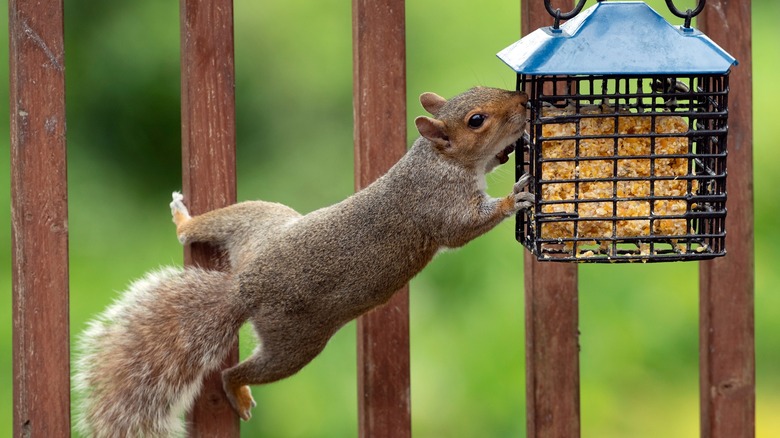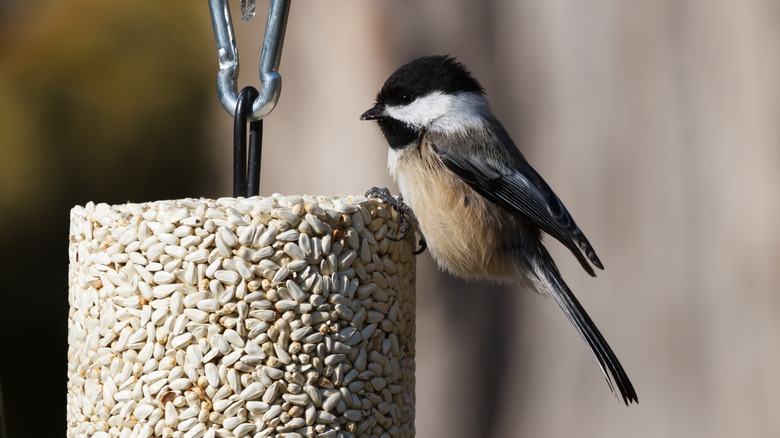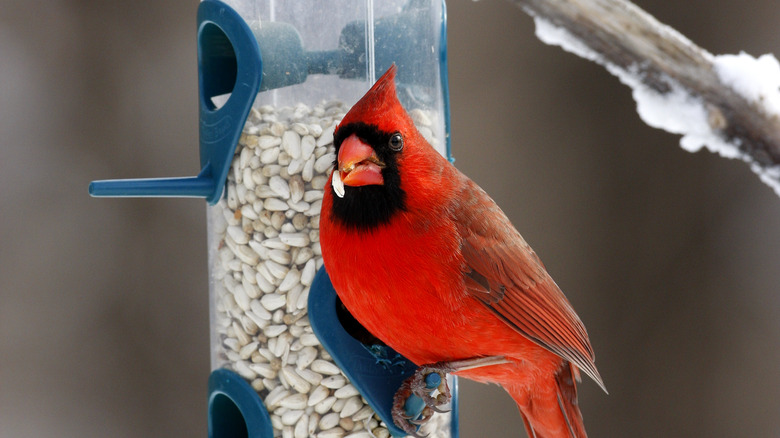The Bird Food Addition That'll Stop Squirrels From Hogging The Feeder
The attempts of squirrels to steal seed intended for garden visitors of the feathered kind make for hilarious social media videos. It's not quite so funny when they're doing it to the feeders hanging in your backyard, though. Big bully squirrels scare away the birds and are voracious, messy eaters. Maybe you've noticed the birdseed line item in your budget is fast getting out of control; the seed is ending up all over the lawn or in the nut hoards of tiny mammals instead of in birds' bellies. To keep squirrels away, try mixing safflower seeds into your selection.
Birdfeeder thieves of the brush-tailed variety (i.e., squirrels) hate the taste, but the songbirds you want to visit your yard don't mind them. Safflower (Carthamus tinctorius) is a flowering shrub in the daisy family. It's grown in temperate regions as an annual, predominantly for cooking oil but also for other uses like natural clothes dye. The seed has a notoriously hard shell surrounding a highly nutritious heart and is beloved by cardinals, chickadees, titmice, grosbeaks, and house finches, among many other species. The downside, at least for squirrels and intimidating birds like grackles, house sparrows, and starlings, is that it tastes decidedly bitter.
Poor taste
According to a 2008 paper published in the European Journal of Lipid Science and Technology, the bitterness of safflower seed stems from the development of oxidized amino acid methionine not long after harvest or, in the case of oil production, pressing. Squirrels, like most mammals, have a well-developed sense of taste; they pass over food they find unpalatable — think spicy, sour, and, of course, bitter — for more attractive options. However, saying that squirrels hate safflower may go a step too far. Evidence shows the wee beasties will eat safflower seeds in a pinch, for example, when preferred food sources are scarce through the cold fall and winter months or before the snow melts in the spring.
Some passionate backyard birders state squirrels get used to the taste, giving it a go anywhere between a few weeks to a year after avoiding it. The rate of like versus dislike may be as high as 50 percent. What's more, chipmunks seem to love the seeds. Though this trick will keep squirrels out of your bird feeder, you may end up with a chipmunk problem instead!
Go for gold
There are two types of avian food-friendly safflower seeds: white and golden (NutraSaff). Growers developed the latter after bird enthusiasts noticed smaller birds avoided safflower seeds because the hard shell is challenging to open. It's also more nutritious than its paler counterpart. Get a 4-pound bag of Valley Farms white safflower seed for $16.50 from Walmart. Need more? Kroger sells a 25-pound bag of 100% U.S.-grown seed for $58.47. A 12-pound bag of the arguably superior Lyric Golden Safflower costs $23.99 at Home Depot.
Before you buy your seed, make sure you have a hopper or tray-style feeder. Safflower is best suited to these feeder designs. Consider your feeding strategy, too. If you plan to DIY your very own birdseed mix with safflower included, you might end up with just safflower left after the birds chow down. That's because many birds opt to eat the tastier, easier-to-crack-open food (like sunflower or peanuts) over tough safflower. Instead, put safflower in a feeder by itself. Due to the seed's squirrel-deterring abilities, it's an excellent addition to feeders hanging in yards crowded with shrubs and trees that make it difficult to use other measures, like attaching baffles or using weight-controlled contraptions.


